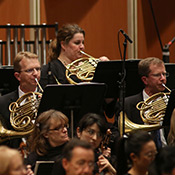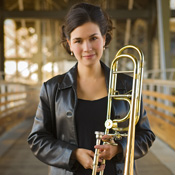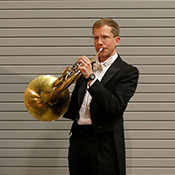
Canadian Brass rings in the holiday season with the MSO
David Lewellen
PUBLISHED
Tagged Under: Brass, Guest Artist, Musician
When Bernhard Scully joined the Canadian Brass in 2004, he was already an accomplished horn player. But he had to learn to be a showman.
“That was a huge learning curve for me,” said Scully, who will perform with the famed quintet on Wednesday at Uihlein Hall with brass players from the Milwaukee Symphony. “I had never run out onto the stage, and I had never done much talking to the audience.” But that kind of interaction is integral to the Canadian Brass, the first full-time brass quintet and still the best-known.
The group will be ringing in the holiday season with double quintet arrangements of carols and more recent tunes, but there will also be comedy and hijinks. “It makes the audience really happy, but we put it in tastefully and time it well,” Scully said. “And it doesn’t work unless you have the highest level of music-making.”
Membership in the quintet has turned over in recent years; the only remaining original member is tubist Chuck Daellenbach. To fit in, Scully said, a musician has to be comfortable with solo and chamber playing, and has to be able to learn a lot of music quickly. And because they spend so much time together in rehearsal and on the road, “you can’t have someone in the group who’s a difficult person. You have to be a team player.”
A brass quintet as a performing unit dates back only to about the 1950s, meaning that any repertoire written specifically for two trumpets, a horn, a trombone and a tuba is probably of recent vintage. But Renaissance and Baroque pieces lend themselves well to brass settings, and the Canadian Brass has commissioned vast quantities of both original music and arrangements of jazz, Dixieland and other genres.
On a particular concert, audiences might hear all of those styles, or only one or two. “We’ll play anything, any time, anywhere,” Scully said. “It depends on what people want from the group. It’s a really different experience. I feel a lot of freedom. It’s different than any of my more traditional experiences as a French horn player.”
When Daellenbach founded the group in 1970, “the goal was to play in Carnegie Hall the evening after the Guarneri Quartet,” Scully said, referring to the famed string quartet that had no shortage of history or repertoire. The Canadian Brass did create that kind of chamber-music identity for themselves, with a “warm, balanced, blended sound,” Scully said, and a style that can go to greater extremes than orchestral brass players usually get to — similar, he thinks, to the difference between playing in a string quartet and in the string section of an orchestra. “But they both take equal skill,” he added.
Playing in the Canadian Brass usually takes up about half the year, Scully said. The rest of the time, he teaches horn at the University of Illinois (“I’m really busy”), which fits well with the quintet’s emphasis on education; they do nearly as many workshops and master classes as they do concerts.
Scully particularly enjoys the kind of double quintet concert they will present in Milwaukee, paired with five brass musicians from the MSO. “We get to play with amazing players,” he said, “and we’ve got some great Christmas repertoire. It’ll be a fun experience for the audience.”



